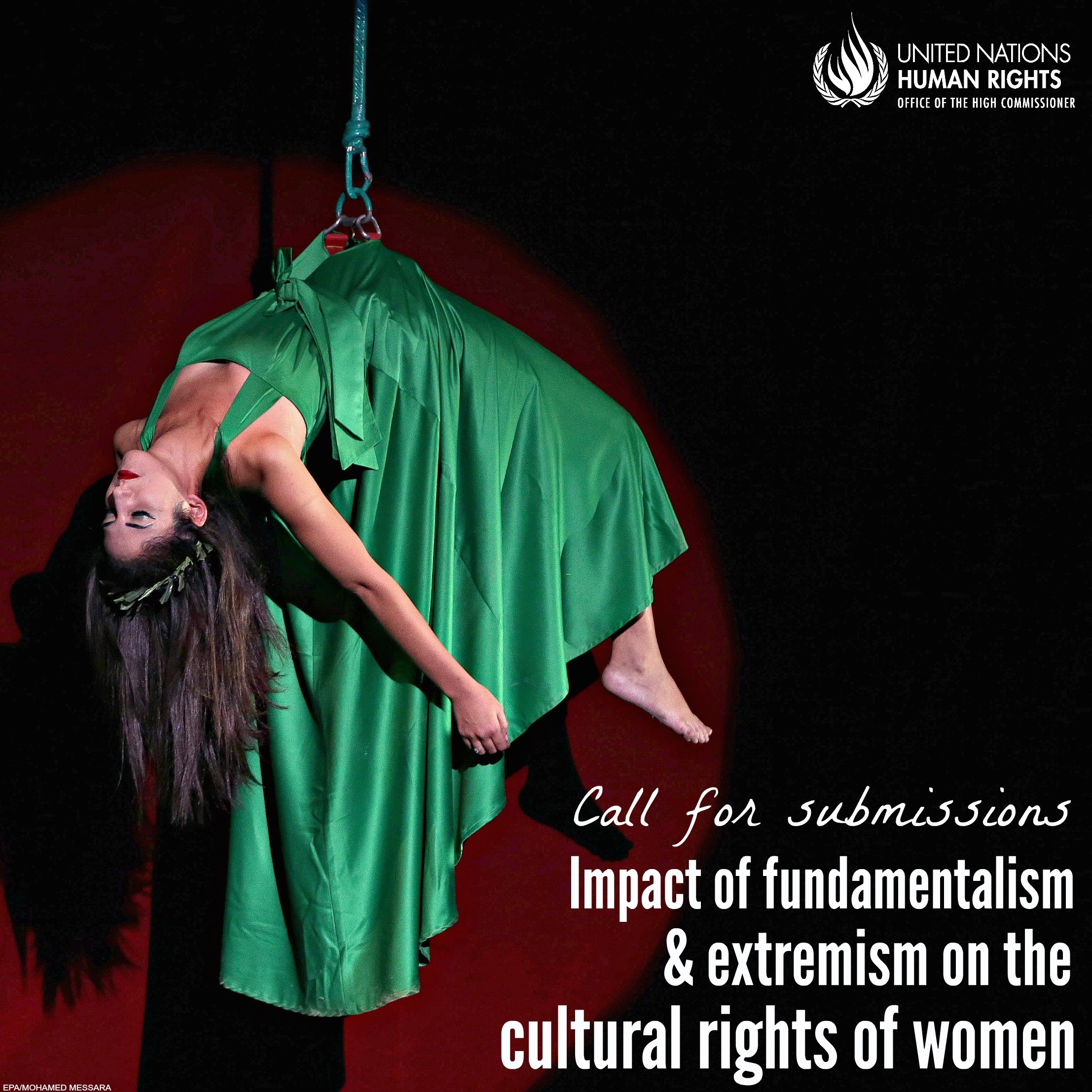Cultural rights of women
Special Rapporteur in the field of cultural rights
When creating the mandate of special procedure on cultural rights, the Human Rights Council specified that the mandate holder should integrate a gender and disabilities perspective into his and her work. Both mandate holders have firmly taken this approach and dedicated targeted attention to these matters in their thematic studies and country visits.
It seemed particularly important to address the cultural rights of women, as culture and cultural arguments are regularly used to advocate for less rights or different rights for women, or to justify discrimination in various aspects of life.
In addition to the dedicated reports listed below, issues concerning the cultural rights of women or the specific challenges for women to exercise them have been integrated in the majority of country visit reports and in other thematic reports.
Reports
The enjoyment of cultural rights by women on an equal basis with men (2012)
In her 2012 thematic report (A/67/287), the Special Rapporteur underscores the right of women to have access to, participate in and contribute to all aspects of cultural life. This encompasses women's right to actively engage in identifying and interpreting cultural heritage and traditions, and to decide which practices, values or traditions are to be kept, reoriented, modified or discarded.
Cultural rights must be understood as also relating to who in the community holds the power to define its collective identity. Preserving the existence and cohesion of a specific cultural community should not be achieved to the detriment of part of its members. In the report, the Special Rapporteur stresses that ensuring the equal enjoyment of cultural rights is an effective way to avoid that cultural arguments be used as an obstacle to the full realisation of women's rights.
In the report, the expert calls on states to address stereotypes that restrict women's full enjoyment of their cultural rights. She calls on actors to question community or religious norms that perpetuate women's subordination. The report also provides a list of issues to help States assess their level of implementation of women's cultural rights on a basis of equality.
The report provides key recommendations to states, such as:
- Abolishing laws that sustain harmful gender stereotypes
- Adopting measures that recognize women's contributions to culture
- Taking action against institutions that threaten women who claim their right to participate in cultural life
- Ensuring girls and women get an equal share of state support for the arts, sports, and sciences
Read the full list of recommendations in the report (A/67/287)
The impact of fundamentalism and extremism on the cultural rights of women (2017)

© Mohamed Messara. An actress performs a scene from the play 'Sin of Success' during the 17th edition of the Carthage Theatrical Days Festival at the Municipal Theatre in Tunis, Tunisia, 18 October 2015. The piece written and directed by Tunisian writer and theater director Meriam Bousselmi explores the situation of Arab women today and their battles for equality with men.
In 2017, the Special Rapporteur dedicated her two thematic reports to the impact of fundamentalism and extremism on cultural rights. This second report (A/72/155) looks more particularly at the impact on the cultural rights of women.
In 2017, the Special Rapporteur dedicated her two thematic reports to the impact of fundamentalism and extremism on cultural rights. This second report (A/72/155) [https://undocs.org/en/A/72/155] looks more particularly at the impact on the cultural rights of women.
Access the report page.
Read more about the impact of fundamentalism and extremism on cultural rights.
Related events and productions
- Opening address by the Special Rapporteur for the second of a series of three online webinars organised by the French national consultative commission for human rights (CNCDH) on women’s rights in France, focusing on culture and education and the transmission of gender stereotypes. Paris, France, 9 March 2021.
- Participation of the Special Rapporteur in a symposium on "Freedom of Religion or Belief, Cultural Rights and Women: promoting a Gendered Perspective on Freedom of Thought, Conscience and Religion", together with the Special Rapporteur on freedom of religions or belief, Geneva, Switzerland, 23 May 2018
- Keynote address by the Special Rapporteur in the field of cultural rights in the Symposium "Women in Culture and Science", organised by the UNESCO Chair on Building Common Ground: Cultural Rights of the University of Copenhagen and the UNESCO division for gender equality, Paris, France, 8 March 2018
- Contribution of the Special Rapporteur to the side event on "Traditional values, culture, religion – Women's Human Rights", Geneva, Switzerland, 30 May 2013
- Feature story: Women's cultural rights: empowering and transformative, 8 November 2012.
- Side event: Ensuring Equal Cultural Rights for Women and Girls, UN headquarters, New York, 2 November 2012
- Participation of the Special Rapporteur in the Human Rights Council's Panel discussion on the issue of remedies and reparations for women who have been subjected to violence, Geneva, Switzerland, 25 June 2012
- Contribution of the Special Rapporteur on "Cultural rights: what are these and why are they important for women's right to development?", to the Asia Pacific Regional Consultation with UN Special Procedures and treaty body experts: Women's Right to Development, Phnom Penh, Cambodia, 26-27 October 2011
- Regional consultation of the Independent expert on cultural rights with representatives to the ASEAN Human Rights Mechanisms, organized by the Asia Pacific Forum on Women, Law and Development, Phnom Penh, Cambodia, 24 October 2011
- Keynote address of the Independent expert in the field of cultural rights, in the side event on "Culture, discrimination and violence against women: Human Rights Challenges", Geneva, Switzerland, 7 March 2011
- Participation of the Special Rapporteur in the South Asia Plus Consultation on "Culture, Women and Human Rights", session on Understanding the scope of culture, the diversity within cultures, its relationship with women's rights activism, Dhulikhel, Nepal, 2-3 September 2010